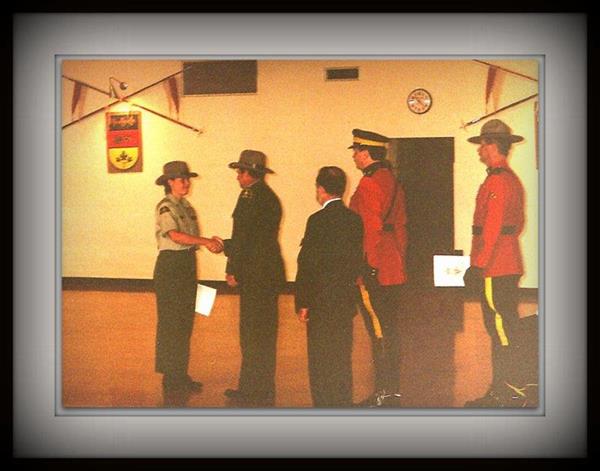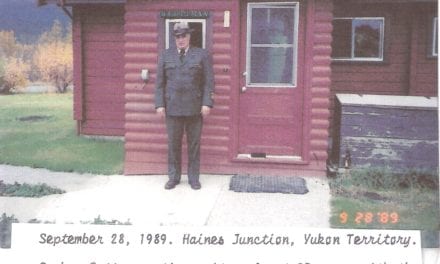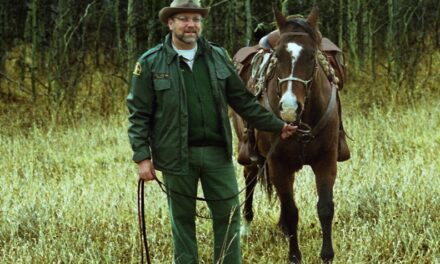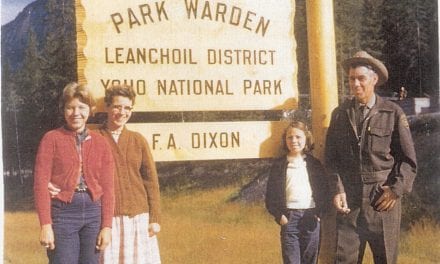
Rundi and Gord Anderson at RCMP depot.
(35:37) Gord – Another good example is the Waslenchuks, Bill and Wendy Waslenchuk. Wendy was born in Banff, a year or two ahead of Travis, but we never really knew her as a child. She was a baby when they were stationed at Windy in Banff. We kind of made a connection because they are in Victoria and she just feels that we are family, you know. We feel the same about her.
(35:57) Sharon – Now we are watching her children grow, more than we got to watch her grow.
(36:02) Gord – They haven’t been part of the warden service for many years, but that is still a big part of their life. So it really affected the people who were part of it even the ones who didn’t stay long. Bill was involved half a dozen years of so and there are many who were only around for a season, but they still have that connection. Like Sid Marty, he didn’t work that many years, but he just can’t give it up! It’s an interesting phenomenon. I guess it is because of the uniqueness of the job and there wasn’t that many people involved overall, considering if you have some 30 odd million (people in Canada) there are only a few thousand who have been part of it.
“What did you like least about being a warden?”
(37:11) Gord – Well, I shouldn’t admit this, but I really wasn’t all that keen on climbing mountains! Maybe it is because I am a prairie boy! But I did climb a few here and there. I managed to get involved in backcountry and wildlife management and whatnot. Willi Pfisterer was grooming me to be a public safety guy eh? Because of my skiing in the early 1970s. But thank God, Clair Israelson and some of those guys came along because it took the pressure off me! I was interested in public safety early on, but as I got older, I wanted to get into other stuff. So that was probably (what I liked) the least, and the law enforcement, I wasn’t really an enforcer type either. I did well in the negotiating end of it. I dealt with people okay I think, but I didn’t write that many tickets in my career even though I was involved with it. Like my first tickets I wrote was a mass thing. There were eight people I think it was skiing out of bounds at Marmot. One of them was a friend of ours and about four of them worked there, including him, he was a manager, the manager of the ski hill! Toni Klettl was skiing with one of the owners up there on a Saturday or Sunday, whatever it was and he saw these guys over there. Of course I come skiing along and Toni points over there and says, “sic em!” I get over there and find all these ski instructors and the manager of the ski hill and those were my first tickets! I gave eight tickets to these guys and they all got about $10 or something…But then I can’t remember when I wrote my next one. So it wasn’t a big part of my career aspirations.
(39:27) Sharon – You believed more in education.
(39:30) Gord – Yeah, I enjoyed the educating part of it when I learned the routines and protocol and so on, I enjoyed passing it on to the people who worked in the function.
(39:42) Sharon – Not only that, when you stopped somebody you would rather educate them about the park…Even when he wasn’t in uniform we would stop when people were building fires in the wrong place, we would talk to them about why (they shouldn’t build a fire there). It was also more of an educational thing that Gord did. He doesn’t give himself that credit, but he did, that was his gift.
(40:09) Gord – But there was only a few guys in those early days that were really into it (giving tickets). One warden was kind of a heavy handed guy in Banff, but I never worked for him, so I didn’t have to (worry about it). There was a few others scattered around here. Andy and the other chief wardens at the time they were more interested in educating like Sharon said. They’d ask, “How many people have you converted to the Parks way of thinking today?” Not, “How many tickets have you written?”
(40:38) Sharon – If the truth were to be told maybe we didn’t educate enough? Maybe Parks wouldn’t be in the situation we are in now, being a money maker situation rather than a place for people to come to reconnect with their soul in nature. I think maybe if we had done a better job, not just the wardens, the whole Parks (system) had done a better job of educating, of why we have national parks and why we are preserving it, why we want to come there, not just to shop or drive though. We come to experience nature and to take our children to experience nature.
(41:30) Gord – Parks actually took a long time to catch on as far as educating their own staff. The other functions – we started sort of a program of taking people out in helicopter trips whenever the opportunity arose…that started in the 1990s with other functions, people from the office, people from general works…I had a good relationship with all of these people because I worked in general works my first job with Parks, so I kind of knew where those guys were coming from. A lot of guys I worked with could care less about Parks. Parks you know all they did was complain. They didn’t try to educate anybody as to why you shouldn’t do this or do that when they are in the park. That started to come around in later years…
(42:26) Sharon – To make people responsible. If you are a carpenter and you are working on something, like putting up signs. You can still educate somebody that stops there and you see them feeding a bear, or feeding something. You maybe are just putting up a sign, but you can say, “You know this could be the death of this bear.”
(42:45) Gord – I think that there is more people wearing national park identification nowadays too, so that gives them a little more pride. Hopefully it gives them more pride in the organization they work for.
(43:10) Gord – Anyway law enforcement and public safety are probably down here and wildlife management and backcountry (are up here).
“Sharon was there anything you didn’t really like about being part of the service?”
(43:30) Sharon – Actually I don’t think so. The people that we met, the people that we socialized with, the opportunities that we had were awesome really! They met my expectations of life and they formed me. Being in the backcountry to start off was great. You really didn’t need a lot of stuff to live, you know. Everything you needed was on the back of a horse. We had children and I really realized that life could be pretty simple and I think that was another gift that I got from my early years. Living on the lookout too, prior to that… I think one of the gifts that we had was learning to be dependent on one another. I had certain tasks that I would do in the backcountry…and even at Athabasca Falls I sold fishing licenses and stuff like that. So there were certain tasks that you took on as a warden’s wife that made you feel part of the service. It wasn’t just that your husband went off to work and you would say, “See you at lunch” or “We will see you at supper.” There were things that you did together. Also raising our kids, the conversations around the dinner table was about a rescue, or about a fire, or about a bear problem…
“Did you do hairdressing?)
(45:18) Sharon – I was working more then, yeah I was a hairdresser. I was working more then, than I had at Athabasca Falls. So then I got to know the community people that way and I became part of the Public Health and an activist at the school! I was their board director. I did that for quite a few years actually.
“Gord, What are some of the more memorable events of your career?”
(46:31) Gord – A broad statement would be working with the grizzly study because the one summer we spent the whole summer following orphan cubs around.) We had them radio collared and we followed them around and took note of what they did, their behavior. That was quite an interesting experience.
(47:04) Sharon – Working with Dick too.
(47:06) Gord – Yeah, Dick Russell…Dick is Andy’s oldest son. He was a biologist with the Canadian Wildlife Service. We haven’t seen him since. He went east and retired down there in Ottawa I think. He was a really interesting guy. He wasn’t at all like his dad, he was very soft spoken, not shy but a soft spoken and easy going guy. I learned a lot about wildlife from him and Jack Nolan, he was a technician with the Canadian Wildlife Service. That was probably one of the big highlights I guess.
(47:52) Sharon – And our backcountry life.
(47:53) Gord – And our backcountry experience. Our couple of summers in the Rocky River, that was pretty interesting too. I guess we were capable to learn, we had the potential to learn, but we really didn’t know a heck of a lot!
(48:11) Sharon – Everything was a new experience.
(48:13) Gord – From what I knew when I retired from what I knew then…But we made it through! We had some good wrecks and whatnot, but no major injuries. We didn’t lose a horse or anything.
“Sharon, did you learn how to ride horses in the backcountry or did you have some previous experience?”
(48:29) Sharon – Basically. We did silly things, like we hauled our cats with us, our two Siamese cats. So we top packed them in a cat box.
(48:38) Gord – Mac (Elder) would always give us heck. He called us the cat farmers!
(48:44) Sharon – He thought we were really crazy taking our cats with us!
(48:52) Gord – We didn’t have mouse problems though!
(48:57) Sharon – But what are you going to do with your cats? I mean we had cats before.
(49:01) Gord – We had them with us, they were part of the menagerie there when we got the job, so they kind of stuck with us.
“Are there any rescue stories that stick out in your mind?”
(49:27) Gord – Well, Sharon had probably the most traumatic one I was up country.
(49:40) Sharon – Well, late at night I get this knock at the door. I had Travis and Rundi at the cabin with me. He was three and she was six months I guess…Gord was up country and it was late at night and this guy came down the mountain. He wasn’t dressed (properly) at all and they had been out climbing.
(50:08) Gord – Scrambling up above Beaver Lake somewhere.
(50:12) Sharon – They were scrambling up there and he had dress shoes on, I think. Anyway I heard his story so I called (for assistance) and Larry Harbidge who at that time was the seasonal warden at Maligne. I got a hold of him through the ring a ding, ding phone (the forestry line) and alerted him to come. This guy was in shock, so I was treating him. I had him covered in blankets and I was trying to get some coherency out of him. Larry came because I couldn’t do anything and the (other) guy was still on the mountain. Larry came and took it from there, but I kind of packed up everything as I was waiting for Larry to come. I was packing up as much first aid stuff as I could find and I got it all together. I can’t remember did the guy die? He did die, didn’t he? And that was Larry’s first trauma. So then when Larry came back, I was not only dealing with this one guy, who was in shock, plus dealing with Larry. He was babbling because this guy was dying on him. That is what I remember…it was these two guys and I was trying to deal with their shock and what they were dealing with.
(51:38) Gord – Who responded, was it Max and Alfie Burstrom wasn’t it, Max Winkler? Do you remember who came up to help recover that guy off there?
(51:50) Sharon – I can’t remember who it was, I just remember Larry because he was young and he was a seasonal warden. He looked like such a boy at the time when I think about it…
(52:08) Gord – He (Larry) was in shock.
(52:13) Sharon – I remember your first recovery and that was when you were a seasonal in Banff.
(52:18) Gord – Yeah, my first rescue was at Minnewanka… In 1969 they were still pulling people off mountains with the basket and the wheel you know. There was a guy on Mount Louis and I can’t remember if it was a fatality or if he was still alive. But there was about 12 guys involved in that. I was sort of called to it late. They were already up there, but they needed help getting him down, because they needed about ten guys to hang onto this thing coming down through that trail eh? We all had ropes and there was this stretcher. They were part way down when I met them. So then I got to be part of the after debriefing thing at the Rundle Café. We went and had some Chinese food and joked and laughed and whatnot and let the tension go there. That was my first rescue.
(53:13) Gord – But the first time I was involved with a helicopter rescue is an interesting story in itself I guess. The first time I rode in a helicopter it was a rescue on Castle Mountain. I forget what they call it, it is the first big chimney closest to Banff. It was a party of three, a young couple and a young fellow that was leading them. They had walked up there the night before to the base where they started climbing, it was up on the scree. They hadn’t even got a full rope line out and the guy who was leading went up and the woman was second. Her husband hadn’t left the ground yet, he was still on the scree slope. The guy in the lead kicked a rock lose and he hollered “Rock!” and she looked up like this…And so the guy had to lower her back down to the scree and then himself and then he ran down to the warden station and alerted Jimmy Robertson. It was on a weekend, it was a Sunday I think. The weather wasn’t really great, it was overcast and of course out there at the gap the wind was blowing. They called Bow Helicopters to send a machine in so that we could fly her off there. That was one of the early helicopter rescues I think. Lo and behold, the guy that came runs Yellowhead Helicopters here now, Garry Forman. We got to be fairly closely associated with him. He was just a young pilot working for Bow Helicopters and he had a hell of a time getting that helicopter through that wind into the park. So it took him a while to get in and once he got there we all met him at the warden station and he flew us up. It was just one of those little what do they call them, J47s or something. Those little bubble things that is all they had. He could take us up two at a time. Six of us went up, and Jimmy was one of them, Jimmy Robertson and Jack Woledge. I can’t remember who the heck the other guys were, but there were six of us and I was the rookie. They were all veteran wardens, I can’t remember who all they were, Billy (Vroom) might have been there. Anyway two at a time we went up. We had to stretcher her down to where the helicopter was and they loaded her and her husband. Gary took them down and then two wardens at a time went back down the hill. But the part that I remember as much as anything else was when he lifted off. He was right on the edge of that cliff and it must have dropped, I don’t know, about 2000 feet. He just lifted off and went down…but the whole thing was pretty sad too. I don’t remember suffering any trauma or anything too much, but I was pretty upset about it.
(56:27) Sharon – When you came home you were really upset because the husband kept saying to you, “She’s dead you know, she’s dead you know.” You don’t remember that, but I remember you coming home telling me that and feeling pretty upset because they were a young married couple and we were a young married couple. So you could relate to that. At that time, the helicopter part, you weren’t talking that much about.
(57:00) Gord – Yeah, that was probably the most memorable one I guess because it was the first serious one, but there was a few others over the years. My last one was actually recovering a dog that jumped off the Athabasca Falls Bridge. That was my last rescue! We got called down to that, it was Lisa Paulson, Steve Blake and myself. We lowered Steve down and he stuffed the dog into a bag and we hauled him back up over the edge of the bridge eh. The dog, they hauled it into town and they patched it up.



